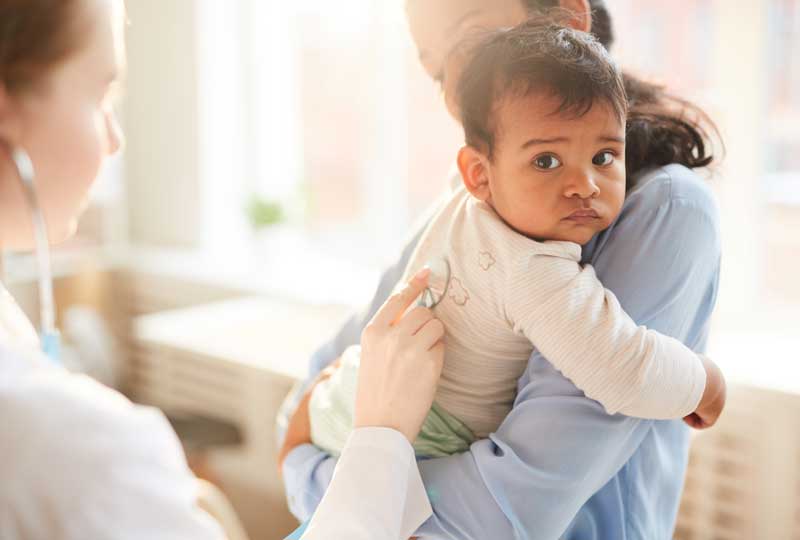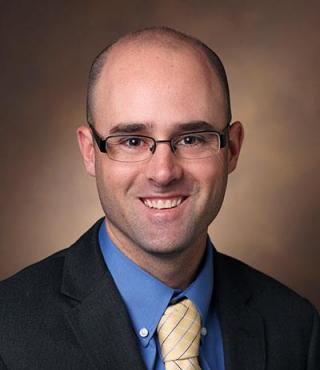When are your child’s breathing problems or persistent cough a cause for concern — and what should you do about it? Read on to learn more about lung disease in children.
If you’re a parent, you know that kids are germ magnets. From daycare to the playground to after-school activities and beyond, our kids romp and play in a veritable petri dish, which means the odd respiratory infection or flu is unavoidable. Kids will sneeze. Kids will cough.
But when should you start to worry about that cough? When might that cough be evidence of something more serious, like lung disease in children? And when, as a parent, should you seek help from a specialist?
“If a child starts to have a cough that is so persistent that it’s affecting their daily activities — their ability to run and play and go to school — and is just not responding to the standard therapies a pediatrician would recommend, it might be time to seek out a specialist,” said Michael G. O’Connor, M.D., a physician with Pulmonary Medicine at Monroe Carell Jr. Children’s Hospital at Vanderbilt. “Likewise, if your child is breathing too hard and too fast and struggling to grow or gain weight, that’s also a sign that you need to come and see a lung doctor.”
When do signs and symptoms of potential lung disease present in kids?
“For any sort of lung disease, the sooner you catch it, the easier it is to intervene before the child falls off the growth curve or begins to have issues with development.”
Chronic coughs and breathing symptoms can present in early infancy or be delayed, not showing up until the childhood years. “I see plenty of kids in their first six weeks of life who either have a chronic cough or chronic wheezing, or who are breathing too hard and too fast,” O’Connor said. “But there are certainly kids I see in the grade school years and beyond who just seem to get sick quite often — kids for whom every infection turns into breathing issues, and that can be really disruptive to life.”
The key, O’Connor said, is to seek help as early as possible after symptoms are noticed. “Pretty universally for any sort of lung disease, the sooner you catch it, the easier it is to intervene before the child falls off the growth curve or begins to have issues with development,” O’Connor said. “Early diagnosis and intervention is so important.”
What types of lung disease might be indicated by a chronic cough or breathing issues?
A chronic cough could simply be indicative of an asthma diagnosis that is not being treated as well as it should be, said O’Connor — if that’s the case, various therapies can be implemented to improve quality of life and prevent future flares.
However, these symptoms might also indicate rarer disorders that affect the lung tissue, more broadly called interstitial lung disease. They might also point to a disease like primary ciliary dyskinesia, or PCD, which affects your body’s ability to clean the airways, making it more likely that pneumonia or other breathing issues will develop with infections. Lastly, the symptoms could be related to cystic fibrosis, or to immune disorders that affect your body’s ability to fight infections.
What can parents do?
First and foremost, if your intuition tells you something seems off about your child’s cough or breathing, it’s important to seek advice from a lung expert.
“Parents of children dealing with lung disease tell me that they just knew something wasn’t right with their child,” O’Connor said. “They felt something was different, and they just needed more information, and more care. And that’s where a subspecialty clinic comes in. If you feel like your child is breathing too hard or too fast, or is getting too many respiratory infections or just isn’t able to recover from them, we can provide further evaluation through testing and diagnostics. We can provide that clarity when things seem to have gotten just a little too complicated.”

Pulmonary Medicine at Monroe Carell Jr. Children’s Hospital at Vanderbilt provides children with access to nationally recognized experts who specialize in pediatric breathing problems. With specialty clinics in Nashville, Franklin, Jackson, Spring Hill, Clarksville and Murfreesboro, Vanderbilt physicians care for your child with compassion and expertise.


